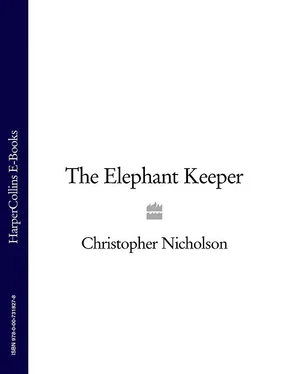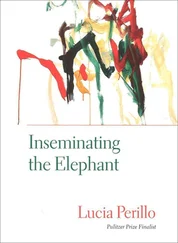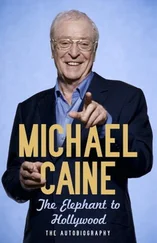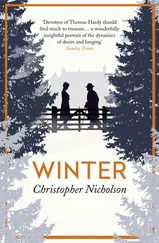When Mr. Harrington heard of my failure, he wrote to Mr. Coad, who kindly drew a sketch of Elephant-riding in the Indies. It shewed a male Elephant, with long tusks, walking in a grove of palm trees. This Elephant was carrying an entire company of passengers, seated in a wooden platform like a broad boat. Such platforms are known in the Hindoo as howdars. In the sketch, the Elephant’s keeper, the mahoot , was seated not on the howdar but on his neck, with his bare feet propped on the bony curves of the Elephant’s ears. This was such an obvious solution to my difficulties that I cursed myself for not thinking of it before and, in spite of the pain in my arm, I took off my shoes and then and there climbed on to Jenny’s neck. I found that, at the narrow junction of the neck, my position was wonderfully comfortable and secure. I could, like the mahoot , rest my feet on her ears, or, if I preferred, I could drop my feet and brace myself with my legs against the sides of her neck. When, by chance, she put down her head, I felt myself in danger of pitching forward and sliding down her trunk, but this was a danger to which I soon accustomed myself; and from this point on I rode the Elephants every day, and what was marvellous and almost incredible, found that I could control them well enough without use of bits or bridles, whips or spurs, or of the ankus, merely by the power of speech.
CHAPTER III

DURING the second summer which the Elephants spent at Harrington Hall we had a period of very hot dry weather which lasted over a month and half. This both pleased and displeased the farmers, for while it helped ripen the corn it was torture to the sheep on the downs, and their thin cries of distress filled the air. Every pond having shrunk to nothing but a muddy stew, I took the Elephants through the corn-fields to a river about three miles away. The river was shallow, the water coming no more than half way up the Elephants’ legs, but they played in it for many joyful hours, shooting water at each other and hauling up quantities of weed, which they flung high in the air.
There came a day of thunder, heard at a distance of many miles, but drawing steadily closer. Now the Elephants became restive, flapping their ears to keep off the clouds of thunder-flies which plagued their eyes, and as the sky darkened, and the growls and rumbles of thunder grew louder, I put them in the cart-house. I attempted to soothe their emotions by talking in a soft voice and stroking their trunks. No animal likes thunder, and the horses were also anxious, while all the birds fell silent. Flashes lit the sky, and the first huge drops began to splash down; then, after a brief pause, when the storm seemed to draw breath, the rain fell in a torrent, pounding the roof of the cart-house with a deafening noise and spurting as it hit the ground. On a sudden the door flew open and in burst Lizzy, her hair dripping. I gave her a horse-blanket to wrap round her shoulders and sat beside her on a heap of straw. ‘You do not mind me being here?’ she inquired, squeezing her hair and looking at me with her dark eyes.—‘Not at all, why should I? How is Mrs. Harrington today?’—‘Mrs. Harrington has bought herself a new dress and is very pleased with herself,’ she said, and took off her shoes. ‘O, I am soaked! How dark it is! How is your elbow?’—‘My elbow?’ I was surprized; I had forgotten my elbow. ‘It is mended, but still a little stiff.’ I bent it slowly, while she watched; then she drew back her sleeve and shewed her own arm, which was very soft and fair in comparison to mine. Her hair dripped on to my arm, and she brushed it off, and let her hand linger on my arm, and then I thought that I should kiss her, indeed that she would like me to kiss her; but I was too shy, and afraid that, if I did, she would make some joke at my expense. Even so, I might have plucked up courage and kissed her, but the Elephants chose to interrupt us, their trunks sliding over our shoulders and joining our hands. The storm continued for more than an hour; when it was at an end, a band of brilliant yellow light shone from under the dark cloud which was moving away to the east. I let the Elephants into the yard, and they splashed and trampled through the puddles with great relish.
This storm was one of the very few times that I saw the Elephants agitated. Although they started at loud noises, for instance when pheasants burst from the undergrowth, or ring doves clattered with smacking wings from the thickets, they were for the most part very placid and even-tempered. However, on one occasion, when we were riding along a track, Timothy came to an abrupt halt and gave a sharp trumpet. At the same moment he stiffened his trunk and pointed: upon which I, leaning over his head and following its line, saw a large viper coiled in the bracken. I urged him on, but he would not budge, nor would Jenny, who was following close behind, and we had to wait until the viper, perhaps conscious of danger, uncoiled itself and slid away. I conclude from this, that both Elephants knew, either by a kind of instinct or because they had seen snakes in the Indies, that snakes were poisonous, which was remarkable, though even more remarkable, to my mind, was that whenever we passed that same spot, both Elephants remembered the viper and checked stride to see whether it was still there.
In the autumn we sometimes met herds of village pigs, rooting for mast. The Elephants did not like pigs, and would hurl pieces of wood, or stones at them, with great accuracy and force. These pigs soon learnt to avoid us, and whenever we drew near would flee in squealing terror. There were also occasions when we unexpectedly encountered horses. On a day of hard frost, as we were walking through a field of bean stubble, we heard the sound of the chase, and presently the hounds came pouring toward us, hot on the drag and barking furiously. They streamed past, pursued by the horses with their riders who, as always, were shouting and tally-hoing in a state of great excitement. Neither of the Elephants was in the least disturbed by the commotion; but one black mare, upon seeing the Elephants, was so unnerved that it shied and threw its rider, a heavily built gentleman by the name of Dr. Chisholm. Dr. Chisholm lived in Gillerton; he was well known both for his love of food and for his fiery temper. His foot now being caught in the stirrup, he was dragged some way through the mire before the horse came to a halt. Picking himself up, he turned on me in a fury, what the d-v-l did I mean parading my d—ned Elephants here, getting in the way of the chase, etc.—I respectfully replied that I was sorry, I had not known that the chase would be coming this way, to which Dr. Chisholm retorted that in that case I must be deaf. He remounted and galloped off.
I was a good deal troubled by this matter, and feared that Dr. Chisholm would complain to Mr. Harrington. I heard no more of it. However, before long, I had occasion to remember the incident and to wonder about its consequences.
The whole of January 1768 was exceedingly cold, with a bitter north wind, and heavy falls of snow. Every morning, as my father and I walked from Thornhill to the Hall, we came upon the bodies of thrushes and blackbirds frozen stiff, and every evening the sun, sinking through a trench of violet, seemed the colour of blood. Several of the horses having fallen ill with a contagious distemper, I became afraid for the safety of the Elephants who, without the protection of a coat of hair, or fur, were exposed to the full rigour of the cold; and though I kept them in the cart-house, and wrapped them in horse-blankets, they were listless and miserable. I could understand the depression of their spirits, for they were used to the heat of the Indies. When the cold deepened, a fine powdery snow blowing through the edges of the door, I lit two small stoves, though it worried me perpetually that the Elephants might accidentally knock a stove over, and set fire to the straw. For this reason I stayed with them all night, rising from my bed to stoke the fires, or to give the embers a puff with the bellows.
Читать дальше













